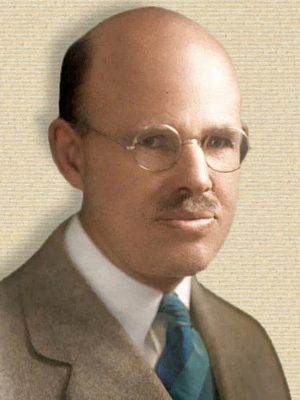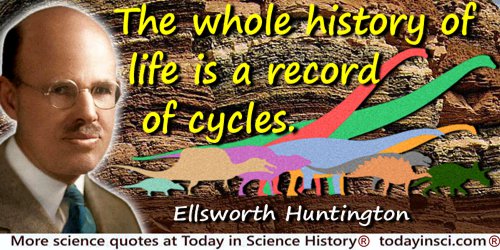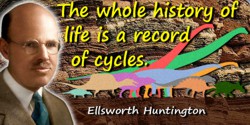 (source)
(source)
|
Ellsworth Huntington
(16 Sep 1876 - 17 Oct 1947)
American geologist, climatologist, explorer and geographer was perhaps the best known geographer of his time. In his early career, he was one of the first explorers of Central Asia. His life's work was studying the effect of climate changes on human culture and civilization.
|
Science Quotes by Ellsworth Huntington (17 quotes)
America forms the longest and straightest bone in the earth's skeleton.
— Ellsworth Huntington
The Red Man's Continent: A Chronicle of Aboriginal America (1919), 36.
As a matter of fact, an ordinary desert supports a much greater variety of plants than does either a forest or a prairie.
— Ellsworth Huntington
The Red Man's Continent: A Chronicle of Aboriginal America (1919), 115.
Curiously enough man's body and his mind appear to differ in their climatic adaptations.
— Ellsworth Huntington
The Red Man's Continent: A Chronicle of Aboriginal America (1919), 10.
Fertile soil, level plains, easy passage across the mountains, coal, iron, and other metals imbedded in the rocks, and a stimulating climate, all shower their blessings upon man.
— Ellsworth Huntington
The Red Man's Continent: A Chronicle of Aboriginal America (1919), 87.
For the source of any characteristic so widespread and uniform as this adaptation to environment we must go back to the very beginning of the human race.
— Ellsworth Huntington
The Red Man's Continent: A Chronicle of Aboriginal America (1919), 9.
From first to last the civilization of America has been bound up with its physical environment.
— Ellsworth Huntington
The Red Man's Continent: A Chronicle of Aboriginal America (1919), 171.
Geologists are rapidly becoming convinced that the mammals spread from their central Asian point of origin largely because of great variations in climate.
— Ellsworth Huntington
The Red Man's Continent: A Chronicle of Aboriginal America (1919), 13.
History in its broadest aspect is a record of man's migrations from one environment to another.
— Ellsworth Huntington
The Red Man's Continent: A Chronicle of Aboriginal America (1919), 2.
In fact, the history of North America has been perhaps more profoundly influenced by man's inheritance from his past homes than by the physical features of his present home.
— Ellsworth Huntington
The Red Man's Continent: A Chronicle of Aboriginal America (1919), 3.
It will be a vast boon to mankind when we learn to prophesy the precise dates when cycles of various kinds will reach definite stages.
— Ellsworth Huntington
Mainsprings of Civilization (1945), 458.
Man could not stay there forever. He was bound to spread to new regions, partly because of his innate migratory tendency and partly because of Nature's stern urgency.
— Ellsworth Huntington
The Red Man's Continent: A Chronicle of Aboriginal America (1919), 12.
Nevertheless most of the evergreen forests of the north must always remain the home of wild animals and trappers, a backward region in which it is easy for a great fur company to maintain a practical monopoly.
— Ellsworth Huntington
The Red Man's Continent: A Chronicle of Aboriginal America (1919), 94.
No part of the world can be truly understood without a knowledge of its garment of vegetation, for this determines not only the nature of the animal inhabitants but also the occupations of the majority of human beings.
— Ellsworth Huntington
The Red Man's Continent: A Chronicle of Aboriginal America (1919), 88.
The human organism inherits so delicate an adjustment to climate that, in spite of man's boasted ability to live anywhere, the strain of the frozen North eliminates the more nervous and active types of mind.
— Ellsworth Huntington
The Red Man's Continent: A Chronicle of Aboriginal America (1919), 20.
The whole history of life is a record of cycles.
— Ellsworth Huntington
Mainsprings of Civilization (1945), 453.
We are learning, too, that the love of beauty is one of Nature's greatest healers.
— Ellsworth Huntington
The Red Man's Continent: A Chronicle of Aboriginal America (1919), 86.
With every throb of the climatic pulse which we have felt in Central Asia,, the centre of civilisation has moved this way and that. Each throb has sent pain and decay to the lands whose day was done, life and vigour to those whose day was yet to be.
— Ellsworth Huntington
Final sentence in his book, The Pulse of Asia (1907), 385.
See also:
- 16 Sep - short biography, births, deaths and events on date of Huntington's birth.
- Context for “Cycles” - quote by Huntington Ellsworth.



 In science it often happens that scientists say, 'You know that's a really good argument; my position is mistaken,' and then they would actually change their minds and you never hear that old view from them again. They really do it. It doesn't happen as often as it should, because scientists are human and change is sometimes painful. But it happens every day. I cannot recall the last time something like that happened in politics or religion.
(1987) --
In science it often happens that scientists say, 'You know that's a really good argument; my position is mistaken,' and then they would actually change their minds and you never hear that old view from them again. They really do it. It doesn't happen as often as it should, because scientists are human and change is sometimes painful. But it happens every day. I cannot recall the last time something like that happened in politics or religion.
(1987) -- 


